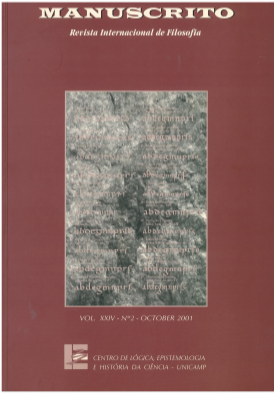Resumen
In his most recent book on Frege (1996), Michael Beaney defends the view that the sense/ reference distinction introduced by Gottlob Frege was meant to solve the paradox of analysis. Upon considering many ways of interpreting the Fregean notions of sense and ways of splitting up the sense of a sentence (a thought), Beaney concludes that the Fregean distinctions cannot help to see a way out of this paradox. Here I will firstly discuss some of Beaney's attempts at making sense of the notion of a sentence's content. I will secondly disagree with Beaney's final proposal as to how to dissolve the paradox of analysis. And I will finally suggest that the solution of the paradox requires a notion of content which is essentially incomplete but completes itself partially as language evolves.
Citas
Beaney, M. (1996). Frege: Making Sense (London, Duckworth).
Clark, P. & Hale, B. (eds.) (1994). Reading Putnam (Oxford, Blackwell).
Davidson, D. (1984). Inquiries into Truth and Interpretation (Oxford, Oxford University Press).
Davidson, D. (1967). Truth and Meaning in Davidson (1984).
Davidson, D. (1969). True to the Facts in Davidson (1984).
Dummett, M. (1959). Wittgenstein's Philosophy of Mathematics in Dummett (1978).
Dummett, M (1973). The Justification of Deduction in Dummett (1978).
Dummett, M (1978). Truth and Other Enigmas (London, Duckworth).
Dummett, M (1994). Wittgenstein on Necessity: Some Reflections in Clark, P. & Hale, B. (1994).
Euler, L. (1736). Solution d'un Problème appartenant à la Geometrie de Situation in Terquem & Gerono (1851).
Evans, G. (1982). The Varieties of Reference (Oxford, Oxford University Press).
Frege, G. (1879). Begriffsschrift, a upon that of arithmetic, for pure thought in van Heijenoot (1967).
Frege, G. (1884). Die Grundlagen der Arithmetik. (Breslau, Köbnet) Translated as Frege (1950).
Frege, G. (1891). Function and Concept in Frege (1984).
Frege, G. (1892). On Sense and Meaning in Frege (1984).
Frege, G. (1893-1903). Grundgesetze der Arithmetik. (Hildesheim, Georg Olms Verlag).
Frege, G. (1914). Logic in Mathematics in Frege (1979).
Frege, G. (1950). The Foundations of Arithmetic transl. by J. L. Austin (Oxford, Blackwell).
Frege, G. (1979). Posthumous Writings. (Oxford, Basil Blackwell).
Frege, G. (1984). Collected Papers on Mathematics, Logic, and Philosophy (Oxford, Basil Blackwell).
Pinto, S. (1998). Wittgenstein, Meaning and Mathematics Ph.D. dissertation (London University).
Terquem & Gerono (1851). Solution d'un Problème appartenant à la Géométrie de Situation, par Euler in Nouvelles Annales de Mathematiques Premiére Serie (10): 106-19.
Van Heijenoort, J. (ed.) (1967). From Frege to Gödel. A Source Book in Mathematical Logic, 1879-1931 (Cambridge, MA, Harvard University Press).
Williamson, T. (1996). Vagueness (New York, Routledge).
Wittgenstein, L. (1922). Tractatus Logico-Philosophicus (London, Routledge).
Wittgenstein, L. (1978). Remarks on the Foundations of Mathematics ed. Anscombe, Rhees & Von Wright, 3rd edition (Oxford, Basil Blackwell) 1st. Edition 1956.
Wright, C. (1983). Frege's Conception of Numbers as Objects. (Aberdeen, University Press).

Esta obra está bajo una licencia internacional Creative Commons Atribución 4.0.
Derechos de autor 2001 Manuscrito: Revista Internacional de Filosofia


